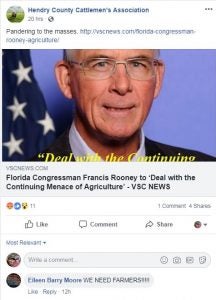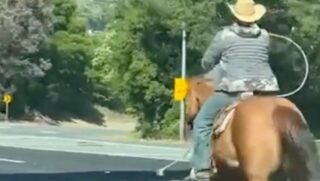Too often we have seen agriculture as a whole thrown under the bus for problems that are easier to cast blame upon, rather than find a solution for. That is exactly what Florida Congressman Francis Rooney did when he said he is trying to “deal with the continuing menace of agriculture in the Everglades Agriculture Area.”
Rooney says, “… The other two things I’m working on is to try to deal with the continuing menace of agriculture in the EAA. One is to remove agriculture from the mission of the U.S. Corps of Engineers. If we could do that, then there would be no reason for them to deny us the water we need in the winter, and to keep from giving us the water we don’t need in the summer.” The congressman was referencing his EAA Reservoir Project.
In an email to AgNet a staff spokesman said, “Congressman Rooney was talking about the sugar production south of the lake, in the EAA Reservoir. The sugar industry pushes the Army Corps of Engineers to keep more water in the lake in the winter than would best meet the needs of the coastal urban areas and which leave a pre-rainy season lake level higher than the minimum possible.”
It is no secret that Rooney is not a fan of Florida’s sugar farmers or the sugar companies in South Florida. Even if he has beef with the sugar farmers, with his word choice, he threw all of Florida agriculture under the bus.
In addition to his statement of agriculture being a menace, Rooney was one of only 47 congresspersons who voted no on the 2018 Farm Bill. In a press release from the office of the congressman, it said, “Congressman Rooney voted against the wasteful farm bill, which included bloated sugar subsidies and lacks work requirements for able-bodied adults,”
To no surprise, Florida farmers have taken to social media to show their distaste for the congressman’s statement.

Even Florida Commissioner of Agriculture Nikki Fried took to Twitter to speak up on behalf of farmers and to shoot down Rooney’s statement.
We all want solutions to our water issues, @RepRooney. But farmers are often the best stewards of our land and environment. They are NOT a menace. They are an asset! https://t.co/X36qBsT22u
— Nikki Fried (@nikkifried) March 11, 2019
This area is also home to where many fruits, vegetables, and cattle are raised — it is much more than just the sugarcane farmers.


